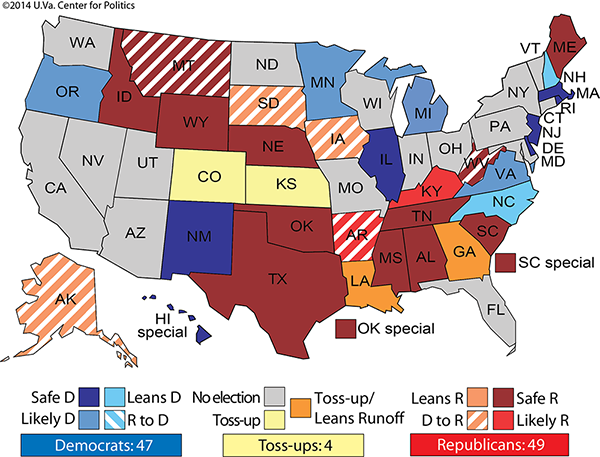Senate Forecast: Cloudy With a Good Chance of a Republican Majority
A Commentary By Kyle Kondik and Geoffrey Skelley
With less than two weeks to go until Election Day, the picture in several key races remains hazy. But when the dust settles, the most likely result is a Republican majority, as the Crystal Ball’s outlook of Republicans adding five to eight seats has long indicated.
The GOP needs at least a net gain of six seats to win back Congress’ upper chamber. But the math is complicated by Sen. Pat Roberts’ (R) struggles in Kansas against independent Greg Orman, and even if Roberts wins, the GOP may not get to 51 seats until after Dec. 6 (Louisiana’s runoff) or even Jan. 6, 2015 (Georgia’s runoff), making it difficult to actually call the Senate for Republicans even this close to Nov. 4.
A rundown of the arithmetic at this point: The GOP looks certain to win Democratic-controlled seats in Montana and West Virginia, both of which we rate as Safe Republican. While ex-Gov. Mike Rounds (R) hasn’t had an easy go of it in South Dakota — thus our Leans Republican rating there — he is still in a decent position to beat Rick Weiland (D) and independent ex-Republican Sen. Larry Pressler in a three-way race. A win in the Mount Rushmore State would give the GOP three pickups.
Down south in Arkansas, Sen. Mark Pryor’s (D) hopes seem to be fading to some degree: A new Talk Business/Hendrix College poll found Rep. Tom Cotton (R) leading the incumbent 49%-41%. While Pryor isn’t completely down and out, it’s increasingly hard to see him overcoming Arkansas’ hard shift to the right. We’re upgrading Cotton’s chances from Leans Republican to Likely Republican. Republicans are hopeful that they’ve put this one away, and the trend line for Democrats is not good.
That would be a net gain of four for the GOP.
In Iowa’s open seat race, state Sen. Joni Ernst (R) is ahead by about 2.5 points in the polling averages over Rep. Bruce Braley (D). While that helps make her a slight favorite at this point, that kind of slim lead in the averages hasn’t proven to be a sure thing in the past. Still, an Ernst win would be a fifth pickup for Republicans.
It’s interesting: The two Democratic-held House districts in eastern Iowa, IA-1 and IA-2, are more Democratic than the state’s other two districts: President Obama won 56% in both of them in 2012. Yet both seem to be getting more competitive in part because of rumblings that Braley is not doing that well in either district. If that’s true, and Braley is doing poorly in the more Democratic part of the state, then perhaps Ernst is doing better than the statewide public polling indicates. Or maybe the House polling is just off: Those surveys often are.
Up north in Alaska, the inconsistent polling history in the Last Frontier still gives us some pause despite the fact Dan Sullivan (R) has consistently led Sen. Mark Begich (D) in recent surveys, though we favor him to win in our ratings. If Sullivan wins, that would give the GOP a sixth seat, and a majority right?
Not necessarily. The Kansas Senate race continues to vex prognosticators. Although Roberts’ fortunes seem to have improved after national Republicans and outside conservative groups entered the race to hammer Orman, the race remains a Toss-up. It appears that over the past several weeks, Roberts pulled himself out of a deficit, moving from down five or more to basically a tie. However, according to our sources, he has not really been able to move into the lead, and Republicans are now worried about outside spending on Orman’s behalf starting to take its toll on the already woefully unpopular Roberts (though it’s not as if Roberts is without air cover himself). One of the Super PACs backing Orman is Harvard Prof. Lawrence Lessig’s Mayday PAC, which raises big money to spend big money on candidates who oppose big money in elections. (Got it?)
Presently, RealClearPolitics’ average actually has the two in an out-and-out tie, while HuffPost Pollster shows Roberts with a lead of under a point. So the Sunflower State’s uncertainty keeps the GOP from getting to a sixth net gain at this point.
What of the other three Toss-ups in Colorado, Georgia, and Louisiana? In the Centennial State, Rep. Cory Gardner (R) continues to lead Sen. Mark Udall (D) in the polling averages. While our view of the race — it remains a Toss-up — is colored by previous problems with polling in Colorado and the state’s new all-mail balloting system, evidence favoring Gardner is mounting, seemingly with every new poll. In effect, Democrats’ retorts to Gardner’s lead in the public polls are beginning to sound somewhat like Republicans in 2012 “unskewing” polls to argue that Mitt Romney would win. We will make our call here — along with the other tough ones — in the days prior to the election.
We currently expect both Toss-up contests in Georgia and Louisiana to head to runoffs. In the former, both sides are hoping to avoid that eventuality, although according to some of our sources, Michelle Nunn (D) might now have a better chance than David Perdue (R) to win outright on Election Day in Georgia, which would be a disaster for the Republicans. In the Pelican State, a runoff is essentially a foregone conclusion at this point. Although Republicans would probably be favored in each runoff, one month (Louisiana) or, particularly, two months (Georgia) is a lifetime in politics, and who knows what new revelations or outside developments may occur between Nov. 4 and the runoff dates? With that in mind, we are erring on the side of caution. Cassidy has a healthy lead on Landrieu in trial heats of the runoff, but the regular electorate might very well be different than the runoff electorate. Those writing Landrieu’s obituary — some of the election models give her less than a 10% chance to win based on polls of a hypothetical runoff — are discounting the inherent uncertainty of the overtime.
Meanwhile in Kentucky, we’re holding at Likely Republican the race between Senate Minority Leader Mitch McConnell (R) and Kentucky Secretary of State Alison Lundergan Grimes (D), even though the Democratic Senatorial Campaign Committee is getting back on the airwaves. McConnell has had a consistent though small lead in polling for months.
Finally, in two states that currently Lean Democratic in our ratings — New Hampshire and North Carolina — we continue to believe that incumbent Sens. Jeanne Shaheen (D-NH) and Kay Hagan (D-NC) are slightly better positioned than their Republican challengers. Hagan is the more vulnerable of the two, but rumors that her race has tightened significantly have not really been confirmed by public polling. One can imagine both seats being washed away in a GOP tide, but as of now the Democrats retain at least a small edge, and remain confident, in both.
The blunt math: Our present ratings leave Republicans with 49 seats and Democrats with 47 seats, with four Toss-ups: Georgia and Louisiana, which both might be heading to overtime, and Colorado and Kansas, where incumbents Udall and Roberts are in deep trouble — especially Udall — but retain a path to victory. To claim a majority, Republicans need to win half of the Toss-up states. Democrats need to win three of them to achieve a Biden Majority (a 50-50 draw with Vice President Joe Biden’s tie-breaking vote giving Democrats the edge). Given the playing field, this arithmetic certainly advantages the GOP, but there is at least some chance that Democrats might pull off the unexpected.
So the Senate remains too close to call, but it’s clear that Republicans are well positioned to win a majority and that Democrats’ backs are up against the wall as Election Day approaches.
Table 1: Crystal Ball Senate ratings changes
Map 1: Crystal Ball Senate ratings
P.S. One overlooked factor in why Democrats find themselves in such a predicament in the Senate is because they were rocked by a lot of retirements at the start of the cycle, as we explain in this new piece for Politico Magazine.
Kyle Kondik is a Political Analyst at the Center for Politics at the University of Virginia.
Geoffrey Skelley is the Associate Editor at the Center for Politics at the University of Virginia.
See Other Political Commentary by Kyle Kondik
See Other Political Commentary by Geoffrey Skelley
See Other Political Commentary
Rasmussen Reports is a media company specializing in the collection, publication and distribution of public opinion information.
We conduct public opinion polls on a variety of topics to inform our audience on events in the news and other topics of interest. To ensure editorial control and independence, we pay for the polls ourselves and generate revenue through the sale of subscriptions, sponsorships, and advertising. Nightly polling on politics, business and lifestyle topics provides the content to update the Rasmussen Reports web site many times each day. If it's in the news, it's in our polls. Additionally, the data drives a daily update newsletter and various media outlets across the country.
Some information, including the Rasmussen Reports daily Presidential Tracking Poll and commentaries are available for free to the general public. Subscriptions are available for $4.95 a month or 34.95 a year that provide subscribers with exclusive access to more than 20 stories per week on upcoming elections, consumer confidence, and issues that affect us all. For those who are really into the numbers, Platinum Members can review demographic crosstabs and a full history of our data.
To learn more about our methodology, click here.





